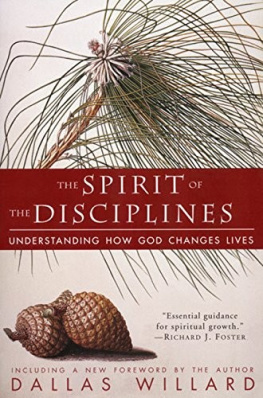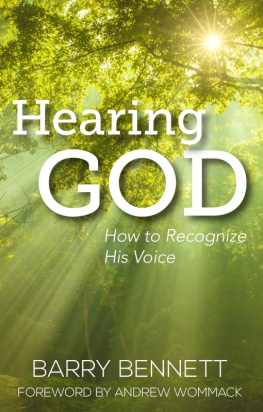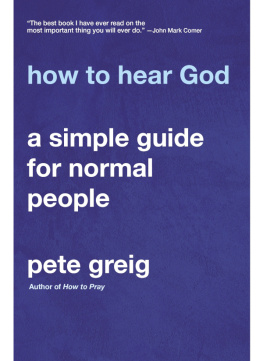Hearing God
Developing a Conversational Relationship with God
Updated & Expanded by Jan Johnson
Dallas Willard

www.IVPress.com/books

Formatio books from InterVarsity Press follow the rich tradition of the church in the journey of spiritual formation. These books are not merely about being informed, but about being transformed by Christ and conformed to his image. Formatio stands in InterVarsity Presss evangelical publishing tradition by integrating Gods Word with spiritual practice and by prompting readers to move from inward change to outward witness. InterVarsity Press uses the chambered nau tilus for Formatio, a symbol of spiritual formation because of its continual spiral journey outward as it moves from its center. We believe that each of us is made with a deep desire to be in Gods presence. Formatio books help us to fulll our deepest desires and to become our true selves in light of Gods grace.
www.IVPress.com/formatio
InterVarsity Press
P.O. Box 1400
Downers Grove, IL 60515-1426
World Wide Web: www.ivpress.com
E-mail: email@ivpress.com
2012 by Dallas Willard
All rights reserved. No part of this book may be reproduced in any form without written permission from InterVarsity Press.
InterVarsity Press is the book-publishing division of InterVarsity Christian Fellowship/USA, a movement of students and faculty active on campus at hundreds of universities, colleges and schools of nursing in the United States of America, and a member movement of the International Fellowship of Evangelical Students. For information about local and regional activities, write Public Relations Dept. InterVarsity Christian Fellowship/USA, 6400 Schroeder Rd., P.O. Box 7895, Madison, WI 53707-7895, or visit the IVCF website at www.intervarsity.org.
Scripture quotations, unless otherwise noted, are from the New Revised Standard Version of the Bible, copyright 1989 by the Division of Christian Education of the National Council of the Churches of Christ in the USA. Used by permission. All rights reserved.
Cover design by Cindy Kiple
Cover photograph: Odilon Dimier/ZenShui/Corbis/Glow Images
Interior design by Beth Hagenberg
ISBN 978-0-8308-6992-3
To Jane Lakes Willard
Sweet lady, Good soldier,
Faithful companion on the way
Contents
Why do people say they hear God but so few can explain it?
What are some common misunderstandings?
Hearing God in Scripture: 1 Kings 19:2-18
How is God with us?
Does God really talk to people?
Hearing God in Scripture: 2 Kings 6:11-17
How has God spoken to people before?
Hearing God in Scripture: Proverbs 20:27;
1 Corinthians 2:9-13, 15-16
What part does Gods Word have in everyday reality?
Hearing God in Scripture: Psalm 19:1-6; 119:89-91
How does hearing God lead to character transformation?
Hearing God in Scripture: Romans 5:10-11; 6:4, 8-11
How do we know we are hearing God and not our own voices?
Hearing God in Scripture: 1 Chronicles 14:8-17
How do we learn to listen to God?
A Word from the Author
M any people feel confused and deficient when it comes to hearing God. In chapter one youll meet my wifes grandmother (Mema to us all) who was one of these. I knew that her experiences with God were not lacking and that she lived a richly interactive life with God. Yet the language of hearing God made her feel like an outsider looking in. I have come to believe that there are many like this dear woman, befuddled by the descriptions others makewhich in many cases may actually involve reducing the intimacy of communion which God desires to the notion of straining for the sound of an audible voice or getting a word after letting a nearby Bible fall open.
Being close to God means communicating with him, which is almost always a two-way street. In our ongoing friendship with God we tell him what is on our hearts in prayer and learn to perceive what he is saying to us. It is this second part of our conversation with God that is found by many to be so difficult or even unapproachable. How can you be sure God is speaking to you? The answer is that we learn by experience. The key is to focus more on building our personal relationship with our Creator and less on individual actions and decisions. Hearing Gods directions is only one dimension of a rich and interactive relationship. Obtaining specific guidance is but one facet of hearing God.
Ultimately, we are to move beyond the question of hearing God and into a life greater than our ownthat of the kingdom of God. Our concern for discerning Gods voice must be overwhelmed by and lost in our worship and adoration of him and in our delight with his creation and his provision for our whole life. Our aim in such a life is to identify all that we are and all that we do with Gods purposes in creating us and our world. Thus we learn how to do all things to the glory of God (1 Cor 10:31; Col 3:17). Learning the two-way communication between us and God will develop as a natural part of such a life.
It is very important to remember and to always keep before your mind this fact: You are an unceasing spiritual being, created for an intimate and transforming friendship with the creative Community that is the Trinity. Learning to hear God is much more about becoming comfortable in a continuing conversation, and learning to constantly lean on the goodness and love of God, than it is about turning God into an ATM for advice, or treating the Bible as a crystal ball. My hope is that this book will help you develop an ongoing relationship with God that will involve conversation, communion and consummation.
Dallas Willard, 2012 Expanded Edition
Preface
H earing God? A daring idea, some would saypresumptuous and even dangerous. But what if we are made for it? What if the human system simply will not function properly without it? There are good reasons to think it will not. The fine texture as well as the grand movements of life show our need to hear God. Isnt it more presumptuous and dangerous, in fact, to undertake human existence without hearing God?
Among our loneliest moments is the time of decision and the need for guidance. The weight of our future life clamps down upon our hearts. Whatever comes from our decision will be our responsibility, our fault. Good things we have set our hearts on become real only as we choose them. But those things or other things yet undreamed of may be irretrievably lost if our choices are misguided. We may find ourselves stuck with failures and dreadful consequences that we must endure for a lifetime.
Then quickly second thoughts dog usand third, and fourth: Did I do the good and wise thing? Is it what God wanted? Is it even what I wanted? Can I live with the consequences? Will others think I am a fool? Is God still with me? Will he be with me even if it becomes clear that I made the wrong choice?
While we are young, desire and impulse and personal associations may carry us through choices that would paralyze us ten years later. In the bloom of youth we just do what we have to do or whatever turns us on. How simple it seems! Often we are not even conscious of having chosen anything. After collecting a few disasters and learning that actions are forever, that opportunities seldom return and that consequences are relentless, we hungrily cry to God, Thy will be done on earth as it is in heaven! More than reflecting a mere general concern for world affairs to conform to his will, our prayer expresses the burning need for God to be a constant guiding presence in our individual lives.















